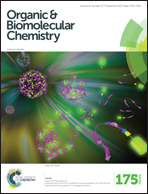Amide bond-containing monodisperse polyethylene glycols beyond 10 000 Da†
Abstract
Although monodisperse polyethylene glycols (M-PEGs) above 4000 Da are especially valuable in biomedical applications, their synthesis remains a long-standing challenge. To this end, a peptide-based strategy for such M-PEGs was developed. With macrocyclic sulfates as the key intermediates, a panel of oligoethylene glycol (OEG) containing ω-amino acids were prepared with high efficiency. Through solid phase peptide synthesis (SPPS), these amino acids were conveniently assembled into a series of amide bond-containing M-PEGs with high flexibility in molecular weight and amide density selection. With this strategy, an M-PEG of 10 262 Da was prepared on a gram scale and its biocompatibility was assessed in a mice model.


 Please wait while we load your content...
Please wait while we load your content...